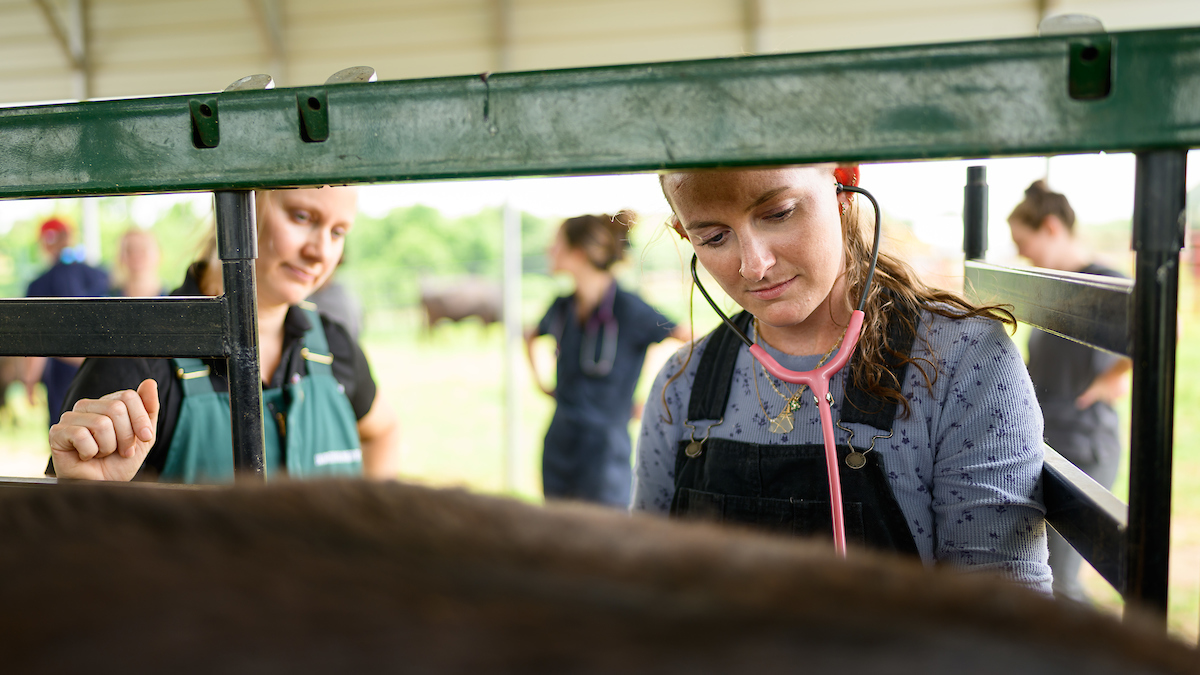Research Roundup NC State Veterinary Medicine, October 2024
Researchers at the NC State College of Veterinary Medicine are at the forefront of medical breakthroughs for both humans and animals. Through comparative studies, new training models, updated teaching guidelines and more, our community is finding creative solutions to the most critical problems facing public health.

Using Comparative Studies to Aid in HIV Vaccination Research
Brochu HN, Smith E, Jeong S, Carlson M, Hansen SG, Tisoncik-Go J, Law L, Picker LJ, Gale M Jr, Peng X.
HIV has infected millions of people worldwide. Unfortunately, there is still no vaccine that can prevent or treat HIV infection. However, comparative medical research has made impressive vaccination advancements. A recent collaborative study, which included members of the NC State College of Veterinary Medicine’s Department of Molecular Biomedical Sciences, explored whether the gut microbiome affects how well a vaccine works in protecting rhesus macaques from an HIV-like virus called RhCMV/SIV. The gut microbiome is known to play a critical role in overall health and immune function, and researchers found that the gut microbiomes of vaccinated macaques had distinct patterns that were linked to whether the vaccine protected the animals from the virus. These gut microbial patterns were also connected to early immune responses in the animals. The results suggest that the gut microbiome might play a role in how effective the vaccine is, which could be important for future vaccine research, including for human trials.
The study was published in Microbiology Spectrum and can be read here.
Developing a New Teaching Tool to Train Veterinary Students in Canine Nasal Procedures
Myerow BS, Pritchard JC, Kalscheur K, Marks S, Royal K, Thoreson N, Pollard N, Hawkins EC.
Currently in veterinary medicine there is no model to train students on the handling skills for a successful rigid rhinoscopy, a procedure that involves using a rigid endoscope to examine the nasal cavity. A rhinoscopy, though necessary to learn, is difficult to teach and conduct because of the complex anatomy and small amount of space of the nasal cavity. To address this, a multi-university collaborative study developed a canine rigid rhinoscopy training model for veterinary trainees. The model included three tubes that were connected to a conduction system that beeped if too much pressure was applied. Both experienced veterinarians and students used the model. While their performance was similar, students found it helpful for improving their rhinoscope control and said it was both fun and challenging. Experts agreed the model could be a good teaching tool with some improvements: It was adequately challenging but not frustrating and emphasized the importance of hand control and indirect hand-eye coordination in the rhinoscopy procedure.
The study was published in Frontiers of Veterinary Science and can be found here.

Providing Guidelines for Treating Pigs as Companion Animals in Veterinary Care
Elane GL, Bauck AG, Hobbs KJ, King A, Fields C, Ziegler A, Blikslager A.
Over the past few years, there has been a steady increase in the number of pigs that are companion animals and in owners bringing their porcine friends to veterinary clinics for care. However, pigs are not usually studied as companion animals in veterinary curricula, so many students graduate from veterinary school with limited handling experience and find it difficult to place IVs and catheters in these animals. This presents a challenge for many new graduates and other primary care veterinarians to improve their knowledge of porcine handling, anatomy and medical care. Because much of the veterinary literature on porcine venous access is dated or inaccessible to many primary care veterinarians, a recent review from faculty of the NC State College of Veterinary Medicine discusses modern techniques in restraint, sedation, venipuncture and catheterization of companion pigs for veterinarians, professors and researchers to use as an updated reference guide.
The research was published in the Journal of the American Veterinary Medical Association and can be found here.
Evaluating Magnesium Levels in Dogs on Long-Term Esomeprazol Prescription
Lee J, Lee S, Song K, Evans S, Her J.
Proton pump inhibitors, or PPIs, are commonly used in both humans and dogs to reduce stomach acid. In humans, they’re prescribed for conditions like acid reflux and ulcers; in dogs, they can also help with neurological issues like hydrocephalus and Chiari-like malformation. However, many patients – both human and canine – use PPIs after they’re supposed to discontinue use and without medical supervision, which raises concerns about potential side effects. One of the concerns is low magnesium levels, which can occur when PPIs interfere with how magnesium is absorbed in the intestines and can cause symptoms like fatigue, seizures and other concerns. While this problem has been well-documented in humans, there hasn’t been much research on how long-term PPI use affects magnesium levels in dogs. That is why a recent retrospective study, including new Department of Clinical Sciences faculty member Dr. Jiwoong Her, aimed to investigate whether dogs on a long-term PPI called Esomeprazol experienced low magnesium levels. The findings of this preliminary study did not find low magnesium levels in the 10 dogs that received long-term PPI treatment for six months or longer but indicated that further studies with more participants and a standard protocol are needed.
The full study was published in the American Journal of Veterinary Research and can be found here.

Investigating Bartonella Infection in People with Mild Cognitive Impairment
Guirguis V, Pupillo F, Rodrigues S, Walker N, Roth H, Liedig CE, Maggi RG, Breitschwerdt EB, Frohlich F.
Mild Cognitive Impairment, or MCI, is a condition that lies between what is considered normal cognitive decline in aging adults and serious conditions like dementia. While neuroinflammation might play a role in its development, it is unknown if there is an infectious link to MCI. A recent study that included members from NC State’s Department of Clinical Sciences explored whether Bartonella spp., a bacterium associated with neurological symptoms, contributes to cognitive decline in older adults with MCI. After testing for past and present Bartonella infections, the results showed no significant difference between people with MCI and those without in terms of active infection or exposure. However, the study did reveal unexpectedly high rates of Bartonella infection in those without MCI. While the findings suggest increased exposure to Bartonella in the population, the study did not support a direct link between Bartonella infection and MCI.
You can find the full study in PLoS One here.
Research Connection: Supporting and Advancing a Department Focused on Clinical Research with Dr. Jan Hawkins
We sat down with Dr. Jan Hawkins, an NC State DVM alumni who returned to the NC State College of Veterinary Medicine in August as head of the Department of Clinical Sciences. He built a career specializing in equine upper respiratory tract disorders and expanding the use of lasers in large animal surgery. Now, in his new role as department head, Dr. Hawkins plans to reinforce the clinical science department’s collegial and collaborative culture, connect students with alumni in their areas of interest and encourage established faculty members to mentor their early-career peers.
- Categories:


